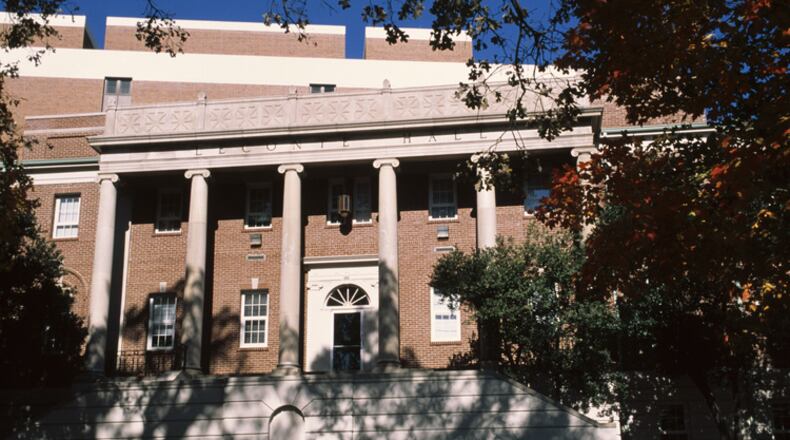How complex is the question of memorials, statues and buildings honoring flawed men who shaped new nations and states yet owned slaves and believed in white supremacy?
The University System of Georgia is about to find out, creating a review committee that met for the first time today to chart what will likely be a contentious and controversial path.
During the 70-minute meeting via conference call, Albany State University President Marion Ross Fedrick, the chair of the new Naming Advisory Group, predicted difficult conversations ahead.
Those conversations are already underway nationwide as America, prodded by recent police killings of black citizens and the protests that followed, faces up to its racist past and present.
This reckoning is not sparing any historical figures, even long revered ones.
Thomas Jefferson owned slaves and fathered six children with one of them; he also created a blueprint of democracy and representative government that guides the United States to this day. Writing this week in The New York Times, Jefferson's sixth-generation great-grandson called for the removal of the Jefferson Memorial in Washington.
Lucian Truscott IV wrote:
The memorial is a shrine to a man who during his lifetime owned more than 600 slaves and had at least six children with one of them, Sally Hemings. It's a shrine to a man who famously wrote that 'all men are created equal' in the Declaration of Independence that founded this nation — and yet never did much to make those words come true…He should not be honored with a bronze statue 19 feet tall, surrounded by a colonnade of white marble. The time to honor the slave-owning founders of our imperfect union is past. The ground, which should have moved long ago, has at last shifted beneath us.
After an opening admonition from University System of Georgia Chancellor Steve Wrigley “to treat every voice the same and give them the same opportunity to be heard,” the advisory group took stock of shifting ground here in Georgia.
The members hope to bring in historians to learn the background and context of how buildings and colleges earned their names in Georgia.
It’s a huge task as there are more than 3,000 buildings on Georgia’s 26 public campuses, although not all carry the names of individuals. However, there are also named colleges and schools within the universities, especially at larger campuses.
One such college is the Henry W. Grady College of Journalism and Mass Communication at the University of Georgia. A campaign has begun to strip the college of Grady's name because the 19th century journalist endorsed white supremacy. There are also calls to address buildings and dorms at UGA named for slave owners, including Joseph E. Brown and LeConte halls.
In addition to Fedrick, the members of the Naming Advisory Group are Michael Patrick, a Chick-fil-A executive, retired Georgia Court of Appeals Judge Herbert Phipps, attorney Neal J. Quirk, executive vice-chairman of the UGA Foundation, and Sally Wallace, dean of the Andrew Young School of Policy Studies at Georgia State University.
Aware of the challenges, the group agreed to meet twice a month and begin its deliberations by looking at the history already available on how names were chosen for buildings and programs.
But Fedrick warned the records will not tell the whole story. “You aren’t going to find in any of these documents that ‘we are going to name this building this because we don’t agree with integration.’”
While the review committee hasn’t yet defined its mission or goal, Fedrick emphasized students ought to be at the forefront. “We must make sure every student who shows up to our campuses is not only accepted but feels accepted, that they feel a part of the culture.”
If you want to comment on any building or program name, you can do so here. The advisory group members will review the comments.
About the Author
The Latest
Featured



